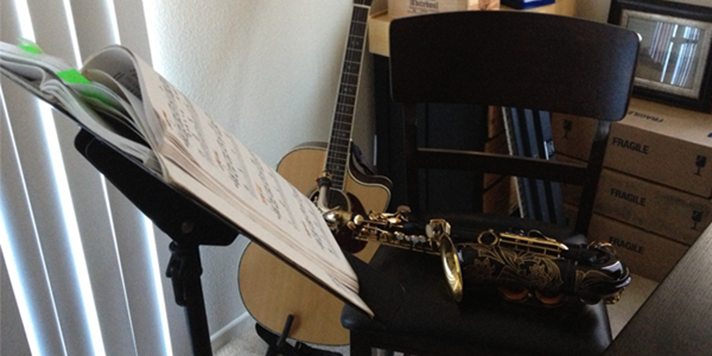We all go through phases where we’re unmotivated to practice. It may be because we’ve stopped seeing immediate improvement, or because we’ve become overwhelmed with the more technical aspects of playing. It may even be because we’ve forgotten why we started to do music in the first place! Regardless of why we may lose our motivation to practice, there are a few things you can do to get past it. Here are some helpful hints to help you find the inspiration.
1. Don’t put it off. Stop procrastinating and force yourself to sit down and practice. Sometimes the hardest part is just getting your instrument out of the case, once it’s in front of you, it’s easier to start.
2. Stop pretending inspiration comes from outside sources. More often than not, inspiration isn’t from outside sources, but from hard and dedicated work. Inspiration only comes if you create the right situation for it to come knocking at your door.
3. Create an area for practicing. Design a dedicated area for practice. Even if it’s a music stand in the corner of your room, make sure you set up a specific area so that each time you see it, you are reminded to practice and when you’re “in” that area, there aren’t any distractions to keep you from doing what you’re there to do. Remove any clutter or distractions.
4. Create a routine. By setting aside a specific time to practice each day, practicing quickly becomes as much of a habit as brushing your teeth and it will feel strange to miss it.
5. Share your intentions. Tell a parent, friend or peer that you plan on practicing and ask them to help hold you accountable. Keep a practice journal and share it with a teacher, publish it to your blog, or take part in “don’t break the chain.”
6. Be nice to yourself. Worrying that you won’t see any improvement, stressing over a passage or piece that you’re having difficulty with or fearing that you fail will all set you up to avoid practicing. Don’t wait for perfection – that’s what practicing is for!
7. “Play” instead of practice or practice something that interests you. Instead of allowing yourself to grow frustrated over something you are currently unable to do, play something that you already know how to do. Sometimes having a little fun when you practice is good! Forcing yourself to work on things that don’t interest you is a quick way to burnout. Make sure you work in time for things you enjoy!
8. Don’t allow yourself to make excuses. We all have the tendency to make excuses to avoid doing things we may find unpleasant. Don’t permit yourself to keep making excuses and just do it.
9. Try to remember how exciting it was when you first started. Do you remember the first time you were able to play a scale or a piece of music regardless of how simple it was? Try to remember that enthusiasm. Write down all the exciting moments you can think of and why you started in the first place. Keep that list near your practice area, and when you start to get frustrated, read it!
10. Give yourself something to work towards. Create a list of goals that you want to work towards to help you keep a clear picture of what you hope to accomplish. It may be that you want to learn how to end your solos better, learn to play new scales, or even take on a double. Regardless what your goals may be, write them down and keep them in mind. I have mine taped to the wall behind my music stand.
What do you do to motivate yourself to practice?
Want to learn more about the music business? Check out our popular FREE eBook – Advice for Young Musicians: From Established Music Professionals.
[template id=”182″]
